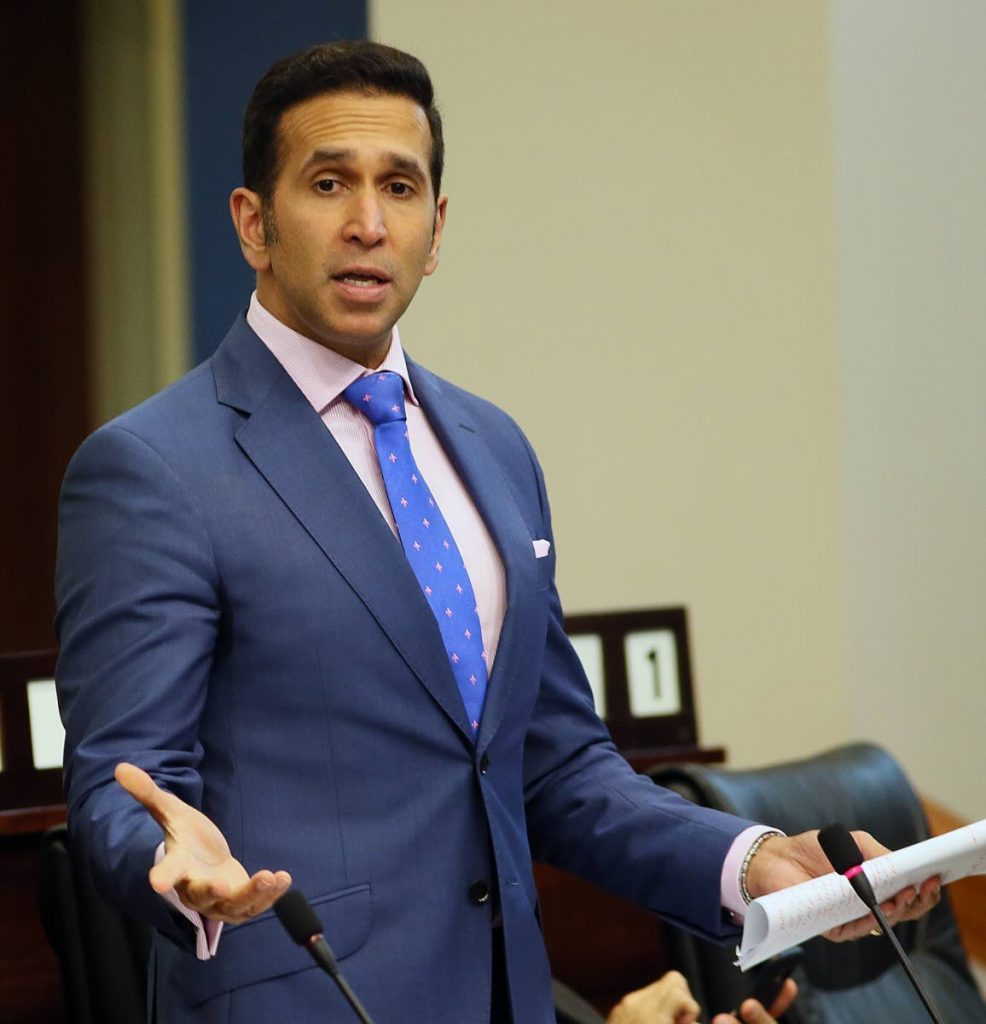Faris: We’ll take bling from zessers

ATTORNEY GENERAL Faris Al-Rawi said “zessers” sporting gold chains will feel the brunt of a bill on unexplained wealth, but Opposition Senator Wade Mark said wealthy property owners should instead be targeted.
The Senate today debated the Civil Asset Recovery and Management and Unexplained Wealth Bill, 2019, as amended by the House of Representatives last week. Al-Rawi was first to refer to zessers, a modern version of a traditional TT character “sagaboy” and a man of leisure who flaunts gold chains, whose lifestyle has been popularised by singer Trinidad Ghost in his viral hit Zesser.
The AG began by saying the $500,000 threshold inserted into the bill in the Lower House, belatedly, would now be reduced for cases of gang activity.
“We are absolutely intent on taking, via due process, the fighting chance against long gold chains, cars that are worth significant value, against people who are generally seemingly unemployed and who have unexplained wealth," Al-Rawi said.
“In our country, where we can be celebrating a song called the Zesser and glorifying a zesserman with a Glock and a Beretta and enticing young people to join gang activity because of the bling, we intend to take the bling away via the court considering if you can’t explain our wealth.
“So the message to all zessers in this country, keep your receipts, show where you got it from your employment, put your trail of evidence together, or make sure you are not on that block demonstrating unlawful gains, because a court of law will be asked to look at you very carefully.”
Otherwise the AG revealed that he learnt that within his ministry hangs a $1 million painting, sent by the US authorities under the Proceeds of Crime Act. He vowed it would not hang in his office, but be lodged with the Civil Asset Trustee being set up under the bill.
Mark, in turn, agreed with the AG that the bill was a legislative "nuclear weapon" but did not like its targets. “It can be manipulated to be a nuclear weapon but not against blingers and zessers but against politicians, rivals and so-called enemies of the people.”
Mark then examined the zessers. "All the AG is concerned about is those with bling, but not those in jacket and tie.” Recalling the novels A Tale of Two Cities and The Prince and the Pauper, Mark said, “This legislation is Sea Lots versus St Clair. Anybody in Sea Lots who has a gold chain will now be under suspicion and the police will come after them because they just suspect.” He said the bill lets some be charged on mere suspicion. Mark said the Government is obsessed with zessers, blingers and Sea Lots, and rather than bring legislation to further enslave the poor and oppressed should instead fix crime by reducing inequality and increasing economic production.
“The AG was very short on focussing on white collar criminality,” Mark said.
“There is a building in St Clair where a landlord charged this country a large amount of money to rent that building. When we looked and did our research, we saw something advertised on the Internet for that same building which was $200,000 less than what we have been asked to pay in TT.” Pointing vigorously at the Government benches, Mark stormed, “When this law comes into effect that landlord must be the first one to explain his wealth. We’ll have to seize that property.”
Mark asked how someone could accumulate enough wealth to now own 250 properties in Port of Spain including the whole of Charlotte Street, saying the AG is familiar with them. Describing the bill as “bad law”, he reckoned it would be struck down if challenged in court by a suspect. Mark vowed not to support the bill unless it is amended to include a preface that says it needs a three-fifth majority. “This is bad law,” he said, dubbing a provision “highly dangerous and disturbing.” Mark objected to the bill reversing the burden of proof where a suspect must prove his innocence. He also disliked "a co-mingling of civil and criminal law," whereby the State can easily met the balance of probabilities threshold (from civil law) for this bill which actually involves the proceeds of crime (related to criminal law offences.)
Earlier Al-Rawi said the bill does not need a three-fifths majority, citing local cases of Surat, Maharaj and De Freitas plus the laws of the European Union, Australia, Canada and several Caribbean countries.
Al-Rawi assured the bill would kick in only if a subject is already being investigated, that a forfeiture order would only be done inter partes (that is with all parties present in court) and that a forfeiture was a gradual process through several steps. The AG said the bill was the “most important” he had ever seen in Parliament, and provided a codification of several existing bits of legislation.

Comments
"Faris: We’ll take bling from zessers"